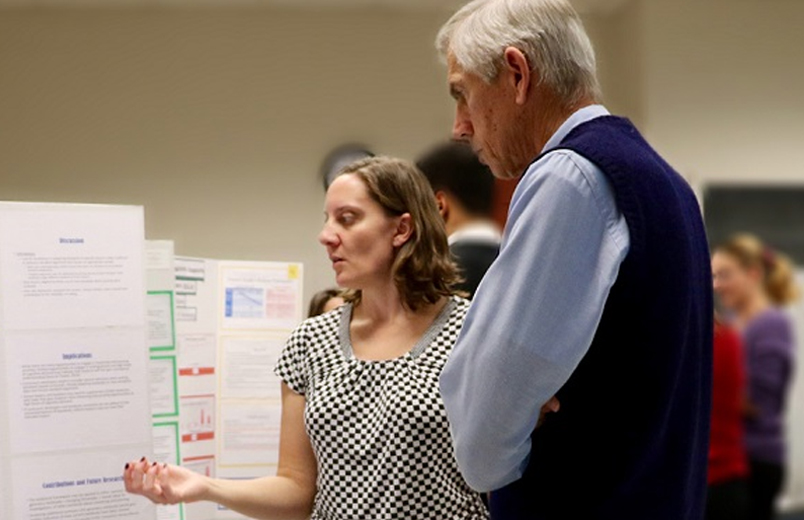Mathematics Education, PHD
On this page:, at a glance: program details.
- Location: Tempe campus
- Second Language Requirement: No

Program Description
Degree Awarded: PHD Mathematics Education
This transdisciplinary PhD program in mathematics education accommodates students from a variety of academic backgrounds. It provides students with a solid foundation in graduate-level mathematics as well as research skills and perspectives that enable them to incorporate mathematics into such core educational areas as:
Conducting individual and collaborative research in the learning and teaching of mathematics is an integral part of the program.
Degree Requirements
84 credit hours, a written comprehensive exam, an oral comprehensive exam, a prospectus and a dissertation
Required Core (12 credit hours) MTE 501 Research in Undergraduate Mathematics Education I (3) MTE 502 Research in Undergraduate Mathematics Education II (3) MTE 503 Research in Undergraduate Mathematics Education Ill (3) MTE 504 Research in Undergraduate Mathematics Education IV (3)
Electives (42 credit hours)
Area Courses (12 credit hours)
Research (6 credit hours) MTE 792 Research (6)
Culminating Experience (12 credit hours) MTE 799 Dissertation (12)
Additional Curriculum Information Four to five graduate-level (500 and above) elective courses from mathematics, cognitive science, psychology, educational technology, philosophy or research should be taken as approved by the advisor.
For the area courses, students are required to take four graduate-level courses from the following areas of interest: mathematics, applied mathematics or statistics. Students should see the academic unit for the approved course list.
Students should see the school's website for information about qualifier and comprehensive examinations based on math coursework.
The doctoral dissertation culminating experience consists of a dissertation prospectus, oral dissertation defense and the submission of a final revised, formatted dissertation document to the Graduate College. Dissertations are composed under chair- and committee-supervised research, including literature review, research, data collection and analysis, and writing.
When approved by the student's supervisory committee and the Graduate College, up to 30 credit hours from a previously awarded master's degree may be used for this program. If students do not have a previously awarded master's degree, the remaining coursework is made up of electives and research.
Admission Requirements
Applicants must fulfill the requirements of both the Graduate College and The College of Liberal Arts and Sciences.
Applicants are eligible to apply to the program if they have earned a bachelor's or master's degree in mathematics or a closely related area, with exceptionally high grades in advanced coursework in mathematics, from a regionally accredited institution.
Applicants must have a minimum cumulative GPA of 3.00 (scale is 4.00 = "A") in the last 60 hours of their first bachelor's degree program or a minimum cumulative GPA of 3.00 (scale is 4.00 = "A") in an applicable master's degree program.
All applicants must submit:
- graduate admission application and application fee
- official transcripts
- statement of education and career goals
- writing sample
- three letters of recommendation
- proof of English proficiency
Additional Application Information An applicant whose native language is not English must provide proof of English proficiency regardless of their current residency.
At least two of the letters of recommendation must be from faculty.
Next Steps to attend ASU
Learn about our programs, apply to a program, visit our campus, application deadlines, learning outcomes.
- Able to complete original research in applied mathematics.
- Able to incorporate mathematical concepts into novel teaching methods.
- Address an original research question in mathematics education.
Career Opportunities
Graduates of the doctoral program in mathematics education have opportunities in Arizona, the U.S. and internationally. Opportunities are typically at research universities and liberal arts colleges, community colleges, and education consulting firms and in roles such as:
- faculty-track academic
- education consultant or analyst
- mathematics professor, instructor or researcher
Program Contact Information
If you have questions related to admission, please click here to request information and an admission specialist will reach out to you directly. For questions regarding faculty or courses, please use the contact information below.
- [email protected]
- 480/965-3951
- Undergraduate Admissions
- Graduate Admissions
- Teacher Certification Options
- International Admissions Information
- Financial Aid & Scholarships
- Undergraduate Majors and Minors
- Master’s Programs
- Certificates of Advanced Study
- Doctoral Programs
- Online, Hybrid, and Flexible Programs
- Faculty and Academic Advising
- Career Services and Certification
- Undergraduate Peer Advisors
- Student Organizations
- Learning Communities
- For Families
- Study Abroad
- Field Placements & Internships
- Bridge to the City
- Spector/Warren Fellowship
- Orange Holmes Scholars
- Engaged BIPOC Scholar-Practitioner Program
- Research News
- Faculty Bookshelf
- Faculty Publications
- Grants & Awards
- Doctoral Dissertations
- Research Resources and Support
- Office of Professional Research and Development
- Atrocity Studies Annual Lecture
- Antiracist Algebra Coalition
- Ganders Lecture Series
- InquiryU@Solvay
- Intergroup Dialogue Program
- Otto’s Fall Reading Kickoff
- Psycho-Educational Teaching Laboratory
- The Study Council
- Writing Our Lives
- Center for Academic Achievement and Student Development
- Center on Disability and Inclusion
- Center for Experiential Pedagogy and Practice
- Latest News
- Upcoming Events
- Education Exchange
- Get Involved
- Advisory Board
- Tolley Medal
- Administration
- From the Dean
- Convocation
- Accreditation
- Request Info
- Grants & Awards
Mathematics Education, Ph.D.
- Admissions & Financial Aid
- Requirements
The doctoral degree in Mathematics Education prepares graduates to engage deeply in the research and practice of mathematics and STEM education and become leaders and advocates of inclusive, antiracist, and equitable mathematics learning.
This program, a partnership between the School of Education and Department of Mathematics , provides students with direct mentorship from mathematics education faculty as well as faculty in the areas of education and mathematics. Faculty are actively engaged in research around the teaching and learning of mathematics, and students are encouraged to work closely with faculty members on their research.
Suggested Application Deadline: January 15 or October 1 | More admissions information
Mathematics Education develops a community of scholars among faculty and students. We generally have around 10 doctoral students at various stages in the program from across the country and around the world; typically, half are international students. A weekly research seminar is held to connect all faculty and students.
Expertise in teaching and instruction is also developed through graduate assistantship and intern opportunities, and with participation in the Future Professoriate Program . This includes orientations, year-round services for teaching assistants, and opportunities to co-teach with fellow doctoral students and department faculty, guest lecture, and independent instruction. Students have many opportunities for pedagogical development and feedback through teaching and tutoring.
This program prepares students with strong mathematical interests and experiences for roles in research on the teaching and learning of mathematics, teacher preparation and professional development, and teaching mathematics and mathematics education courses.
Program Contacts


- Apply to UW
- Programs & Majors
- Cost & Financial Aid
- Current Students
- UW Libraries
- Degree Plans & Courses
- Advising & Career Services
- UW College of Law
- Honors College
- Academic Affairs
- Geological Museum
- All Colleges
- Campus Recreation
- Campus Maps
- Housing & Dining
- Transit & Parking
- University Store
- Student Organizations
- Campus Activities
- Campus Safety
- Diversity, Equity & Inclusion
- Research & Economic Dev.
- Wyoming INBRE
- Neuroscience Center
- Technology Business Center
- National Parks Service
- Research Production Center
- Supercomputing
- Water Research
- WY EPSCoR/IDeA
- American Heritage Center
- Where We Shine
- About Laramie
- Student Stories
- Campus Fact Book
- UWYO Magazine
- Marketing & Brand Center
- Administrative Resources
- Strategic Plan
- +Application Login

Mathematics Education Ph.D.
Bachelor's Degrees | Master's Degrees | Doctoral Degrees | Certificates & Endorsements | About | Advising | Donate
The Doctor of Philosophy in Curriculum and Instruction with a concentration in Mathematics Education at the University of Wyoming offers advanced coursework for educational professionals interested in pursuing a degree whose advanced study might someday lead them to research-oriented careers, primarily working in university settings.
Courses in the program are offered online, allowing you to pursue the Ph.D. in mathematics education while you continue in your current professional role. Candidates in this program aim to be scholar-leaders for the field of mathematics education at colleges and universities worldwide. As a student in the program, you will begin developing your research agenda under the mentorship of experienced academic researchers.
Learn more about the benefits of gaining your Ph.D. degree in education at UW .
Interested in a doctoral program where you will utilize applied research to solve a current problem of teaching practice? Take a look at our Ed.D in programs in education.
Email Mathematics Education Program Coordinator Dr. Rick Kitchen, [email protected] or take a look at our FAQs page .
ADDITIONAL INFORMATION
ADMISSION Learn how to apply and start your journey today.

CURRICULUM Learn about required classes and requirements.
RESOURCES Find resources for students and faculty members .

FACULTY Meet the supportive teacher preparation faculty team .

_linkedin_partner_id = "1170812"; window._linkedin_data_partner_ids = window._linkedin_data_partner_ids || []; window._linkedin_data_partner_ids.push(_linkedin_partner_id); (function(){var s = document.getElementsByTagName("script")[0]; var b = document.createElement("script"); b.type = "text/javascript";b.async = true; b.src = "https://snap.licdn.com/li.lms-analytics/insight.min.js"; s.parentNode.insertBefore(b, s);})(); School of Education
Ph.d. in education mathematics education specialization .
Doctoral students in the Mathematics Education specialization work closely and collaboratively with faculty, engaging in research designed to enrich mathematics teaching and improve mathematics learning for all students. A distinctive feature of the specialization area in mathematics education is the integration of teaching and research experiences.
Students in this specialization
- Examine critical issues of mathematics teaching and learning across K-12 and undergraduate levels.
- Teach undergraduate mathematics content and methods courses for prospective K-8 teachers.
- Participate in course instructor groups to study and revise components of these courses.
- Conduct research in your area of interest with the support of internationally-recognized faculty.
- Engage in multiple opportunities to present research in progress and receive feedback from faculty and peers.

Program Coordinator: Dr. Teomara Rutherford
Specialization Coordinators: Dr. Charles Hohensee
Admission Requirements
In addition to the admission requirement of all applicants to Ph.D. programs in the School of Education, applicants to the program in Mathematics Education are expected to hold a Bachelor’s degree in mathematics or equivalent and/or a Master’s degree in mathematics, mathematics education, or a related field. School teaching experience is preferred. Applicants with special strengths and somewhat different profiles, such as educators who have an interest in further exploring the teaching and learning of mathematics, will also be considered.

Specialization Coursework
In addition to the Doctoral Core Courses, the following specialization courses are required of all Ph.D. students in mathematics education.
- EDUC 833: Research and Theory of Mathematics Learning
- EDUC 834: Research and Theory of Mathematics Teaching
- EDUC 835: Research and Theory of Mathematics Curriculum
- EDUC 836: Research and Theory of Mathematics Teacher Education and School Improvement
Note: the fourth course fits into the curriculum as a course needed for the specialization.
Sample Course Schedules
Sample Mathematics Education course schedules for students who enter the Ph.D. program in the following semesters are available through the links below.
- Students entering in the Fall of odd years
- Students entering in the Fall of even years
Specialization Requirements
All PhD students in the mathematics education specialization must complete the following additional requirements.
- Enroll in the seminar course EDUC 838: Research Issues in Mathematics Education (1 credit) in the first 3 semesters for credit and in the remaining semesters as a listener.
- Complete a Qualifying Study that will be submitted as part of your Qualifying Examination.
- Pass the Qualifying Examination in mathematics education, taken after completion of the four mathematics education courses (usually taken during the summer of Year Two).
- Develop a portfolio demonstrating expertise in the common activities of the profession (e.g. , presenting a paper at a professional conference).
Alterations in the program require approval of the full faculty in mathematics education.
Recent Graduates
Our graduates accept academic positions in research universities, departments of education, and school districts, as well as industry positions in educational organizations.
For example, recent PhD in Education graduates with a mathematics education specialization have accepted positions at Washington State University, Western Michigan University, Iona College, University of Southern Mississippi, University of California Chico, Delaware State University, University of Delaware, The College of New Jersey, Towson University, Central Michigan University, West Chester State University, University of Missouri, Rowan University, Salisbury University, Kennesaw State University, University of Northern Iowa, University of Pittsburgh, California State University in Fullerton, Stockton University, Montclair State University, Shippensburg University of Pennsylvania, Purdue University Fort Wayne, Virginia Tech University, Illinois State University and Manhattanville College.
Program Faculty
Our faculty hold grants from the National Science Foundation, the Institute of Education Sciences and private foundations. They have been recognized for their work by the American Educational Research Association, American Association of Colleges of Teacher Education and National Council of Teachers of Mathematics.

Doctoral Students

Student Spotlight

Amanda Mohammad Mirzaei
“I have experienced a rigorous program in pursuing my Ph.D. in Education at UD, and it certainly hasn’t been a walk in the park. However, the support from the faculty and other graduate students has guaranteed that even at its most difficult, juggling the demands of this degree while pursuing a personal life isn’t impossible. I am happy that I chose the University of Delaware for my Ph.D. program and I would choose it again without hesitation.”
Research Projects
Request More Information
Visit Campus
- Major and Minors
- Graduate Programs
- Prospective Students
- Academic Calendar
- Social Media
- 113 Willard Hall Education Building , Newark, DE 19716
- Phone: (302) 831-8695
- Fax: (302) 831-4110
Mathematics Education PhD
Doctor of philosophy.
The Doctor of Philosophy (Ph.D.) degree emphasizes research competencies. The degree requires a scholarly dissertation of intellectual merit and sound research methodology. Dissertation research may include analytical studies of the process of teaching or experimental studies of the teaching-learning process, including studies of verbal learning and laboratory practice or historical studies.

Admissions Information
Displaying requirements for the Spring 2024, Summer 2024, and Fall 2024 terms.
- Points/Credits: 75
- Entry Terms: Spring, Summer, Fall
Application Deadlines
For details about rolling deadlines , visit our admission deadlines page.
Select programs remain open beyond our standard application deadlines , such as those with an extended deadline or those that are rolling (open until June or July). If your program is rolling or has an extended deadline indicated above, applications are reviewed as they are received and on a space-available basis. We recommend you complete your application as soon as possible as these programs can close earlier if full capacity has been met.
Application Requirements
Requirements from the tc catalog (ay 2023-2024).
Displaying catalog information for the Fall 2023, Spring 2024 and Summer 2024 terms.
View Full Catalog Listing
Doctoral Degrees
All candidates for the Ed.D., Ed.D.C.T., or Ph.D. degrees are expected to demonstrate both mathematics and mathematics education competencies through a series of certification examinations taken upon the completion of 60 graduate points. Certification examinations test the student’s knowledge of current research and theory in mathematics education and mathematics content. Examinations are offered once in the fall, spring, and summer terms. Courses recommended as preparation for the examinations in mathematics education include MSTM 6037, MSTM 4019, and other mathematics education courses; Courses recommended as preparation for the examinations in mathematics are 6000- level mathematics content courses.
Students must demonstrate acceptable proficiency in at least three of the following six mathematics content areas: algebra, analysis, discrete mathematics, foundations of mathematics, geometry and topology, and probability and statistics. Students may sit for the examination in mathematics content during the regular certification examination times. Alternatively, they may register for advanced content courses and, with permission of the program, sit for the content area certification examination upon completion of the course. Incoming doctoral candidates should register for MSTM 6037 Professional Seminar in Mathematics during the first year of doctoral studies.
Doctoral students whose dissertations require statistical analysis should include appropriate statistics courses in their programs. These points can be included either in the mathematics/mathematics education requirement or can be taken as research electives.
Doctor of Philosophy in Mathematics Education
The Doctor of Philosophy (Ph.D.) degree emphasizes research competencies. The degree program requires a scholarly dissertation of intellectual merit and sound research methodology. Dissertation research may include analytical studies of the process of teaching or experimental studies of the teaching-learning process, including studies of verbal learning and laboratory practice or historical studies.
Candidates are encouraged to develop an association with a faculty member early in their studies to identify a problem area of mutual interest to plan a course of studies that leads to the competencies needed to complete dissertation research and prepare for a professional role. Further details are available in the brochures on doctoral studies and in the general descriptions of doctoral programs available from the Office of Doctoral Studies (ODS).
A program of study for the Doctor of Philosophy degree must include at least 45 points taken under Teachers College registration. In order to permit the acquisition of broad and basic scholarship, each program of study should include at least 60 points in mathematics, mathematics education, statistics, and computing. At least 35 points should be in advanced courses – including research courses (MSTM 6500 or 6501 and MSTM 7500). (Any Teachers College course at the 6000 level or above, any Columbia University Graduate School of Arts and Sciences course with a “G” prefix, any “W” course numbered above 4000, or any transferred course with a graduate-level prerequisite will be considered an advanced course.) Further, 15 points in the philosophical, psychological, and curricular foundations of education must be included in every Ph.D. degree program. Students whose dissertations require statistical analysis should include appropriate statistics courses in their programs. These points can be included either in the mathematics/mathematics education requirement or can be taken as research electives.
Candidates for the Ph.D. degree are required to demonstrate competency in two languages chosen from among French, German, and Russian. Students who require other languages for the preparation of their dissertation may petition the program to request one substitution. Students in mathematics may not use computer languages or statistics to satisfy the language requirement.
The Ph.D. dissertation is a scholarly study contributing new theoretical knowledge to the field and should be planned early in the program when sufficient advanced courses have been completed to permit the candidate to enroll in relevant research courses. Ph.D. dissertations in mathematics education should be (1) experimental studies in learning, (2) analytical studies in policy theory in mathematics education, or (3) other scholarly investigations of problems and issues of broad significance in the field.
The website of the Program offers a list of Topic study groups which doctoral students are recommended to join.
- View Other Degrees
Program Director : Professor Alexander Karp
Teachers College, Columbia University 323 Thompson
Phone: (212) 678-3381 Fax: (212) 678-8319
Email: tcmath@tc.edu

IMAGES
VIDEO
COMMENTS
Degree Awarded: PHD Mathematics Education. This transdisciplinary PhD program in mathematics education accommodates students from a variety of academic backgrounds. It provides students with a solid foundation in graduate-level mathematics as well as research skills and perspectives that enable them to incorporate mathematics into such core ...
The doctoral degree in Mathematics Education prepares graduates to engage deeply in the research and practice of mathematics and STEM education and become leaders and advocates of inclusive, antiracist, and equitable mathematics learning.
Candidates in this program aim to be scholar-leaders for the field of mathematics education at colleges and universities worldwide. As a student in the program, you will begin developing your research agenda under the mentorship of experienced academic researchers.
Mathematics Education Specialization. Doctoral students in the Mathematics Education specialization work closely and collaboratively with faculty, engaging in research designed to enrich mathematics teaching and improve mathematics learning for all students.
All candidates for the Ed.D., Ed.D.C.T., or Ph.D. degrees are expected to demonstrate both mathematics and mathematics education competencies through a series of certification examinations taken upon the completion of 60 graduate points.